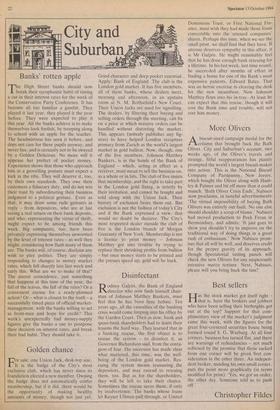Golden chance
For sale: one Union Jack, desk-top size. It is the badge of the City's most exclusive club, which has never since its foundation elected a new member. Owning the badge does not automatically confer membership, but if it did, there would be the opportunity of making healthy amounts of money, though not just yet. Good character and deep pocket essential. Apply: Bank of England. The club is the London gold market. It has five members, all of them banks, whose dealers meet, morning and afternoon, in an upstairs room at N. M. Rothschild's New Court. Their Union Jacks are used for signalling. The dealers, by filtering their buying and selling orders through the meeting, can fix on a price at which massive orders can be handled without distorting the market. This appears (nobody publishes any fig- ures) to have helped London recapture primacy from Zurich as the world's largest market in gold bullion. Now, though, one of the five members, Johnson Matthey Bankers, is in the hands of the Bank of England — which, acting in effect as a receiver, must mean to sell the business on, as a whole or in bits. The club of five insists that membership, and the right to take part, in the London gold fixing, is strictly by their invitation, and cannot be bought and sold along with the Union Jack. Their history of exclusion bears them out. But exclusion is not the fashion of today's City and if the Bank expressed a view, that would no doubt be decisive. The City's most respected dealer outside the club of five is the London branch of Morgan Guaranty of New York. Membership is not a licence to print money — Johnson Matthey got into trouble by trying to replace their shrinking profits from bullion — but once money starts to be printed and the presses speed up, gold will be back.






















































 Previous page
Previous page